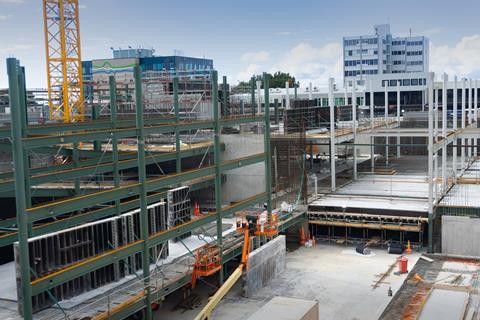Material prices also rise at fastest rate since April 2023 despite weaker demand
Economic uncertainty and nervous clients have led to the steepest contraction in construction output since November 2023, according to new PMI data.
The S&P Global UK Construction Purchasing Managers Index sank to 48.1 in January, down sharply from 53.3 in December and the first fall below the 50 ‘no-change threshold’ since February last year.

Output slumped in all three categories of construction work, with commercial work falling to 48.9 due to a lack of tender opportunities and reluctance among clients to commit to new jobs.
Consecutive falls in housebuilding output over the past four months accelerated in January as the index dropped to 44.9, the fastest decline in 12 months, while bad weather sent civil engineering activity tumbling to 44.6.
Survey respondents reported a dip in confidence among clients following the government’s tax raising budget, unveiled last autumn, alongside weakening sales pipelines and the impact of lacklustre economic growth.
>> See also: The chancellor has put infrastructure at the very centre of her growth plan – so where is the sense of excitement?
January data pointed to a decline in incoming new work for the first time in 12 months, with anecdotal evidence suggesting worries about the UK economic outlook had contributed to fewer sales enquiries.
And despite softer demand for construction products and materials, the latest survey indicated the steepest rise in input costs since April 2023 as suppliers passed on rising energy, transportation and staff costs while lead times were at their longest for two years.
Tim Moore, economics director at S&P Global Market Intelligence, said: “UK construction output fell for the first time in nearly a year as gloomy economic prospects, elevated borrowing costs and weak client confidence resulted in subdued workloads.
“Anecdotal evidence suggested that caution regarding demand for new projects was prevalent at the start of 2025, despite strong policy support for house building and hopes for a longer-term boost to supply via planning reform.”
>> See also: Chancellor confirms backing for third runway at Heathrow
Although around 38% of the survey panel predicted a rise in business activity over the year ahead and only 17% forecast a reduction, this was the lowest degree of business optimism since October 2023.
Atul Kariya, head of real estate and construction at MHA, the UK arm of accountant Baker Tilly International, said: “It is hardly surprising that construction PMI activity has fallen as the industry and the economy as a whole are now starting to see the full impact of the proposed tax rises and increased labour costs in the Autumn Budget.
”These are starting to feed through into overall business sentiment in the sector as well as ongoing challenging economic conditions in the UK and overseas. The glimmers of optimism that the industry witnessed in September last year when the PMI soared to 57.2 now seem a little distant, despite order book and enquiry levels remaining relatively buoyant.”
Aecom head of cost management and commercial Brian Smith added: “A winter slowdown is unsurprising given the broader economic mood but confidence will need to improve quickly if the sector is to regain some of 2024’s momentum and deliver on the government’s growth agenda.”
Thomas & Anderson technical director Jordan Smith added: “The overall construction PMI reading falling into negative territory for the first time in nearly a year is not unexpected – accelerating cost inflation, weaker economic conditions, and higher borrowing costs have slowed the sector’s recovery.”




























No comments yet